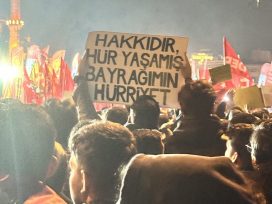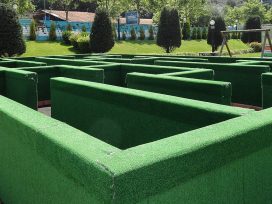There’s nothing natural about Turkey’s earthquake disaster
Two decades of speculative building and misuse of earthquake funds set Turkey up for disaster. Erdoğan’s AKP failed to plan or react, but will do anything to hang on to power.
The current crisis in Turkey is not a natural disaster but a political one. We knew that a massive earthquake would hit southeastern Turkey. For many years, several geologists have not only specified where the fault line would most likely break but also which individual settlements the ensuing earthquake would target. No one can pretend that the February 7 earthquake in Turkey was unexpected, yet thousands of people still died due to this disaster.
The area affected by the earthquake is roughly as big as Indiana or Portugal. It hit 10 out of the 81 provinces in Turkey, which contain the hometowns of 13.4 million people and 3.3 million households, approximately 16 percent of Turkey’s total population.
According to the initial official count, at least 6,444 residential buildings collapsed due to the earthquake. According to my calculations, based on the Turkish Statistical Institute’s recent National Building Survey, roughly 60,000 people lived in those buildings. So no one should be surprised if the final count hits a six-digit number, and it will likely exclude many undocumented Syrian immigrants, currently the target of a hate campaign by the Right in Turkey.
Constituting 9 percent of the national economy in 2021, this region was also one of the fastest growing portions of the country economically with a flourishing manufacturing base. It produced roughly 10 percent of Turkey’s manufacturing output, while these 10 provinces together have grown their share in the country’s manufacturing output by 27 percent since 2004. Gaziantep, the biggest industrial producer among them, raised its share in the nation’s manufacturing output by 42 percent.
The Turkish public wants answers. Why did government agencies respond so ineffectively to the earthquake? And how did the governing Justice and Development Party (AKP) set the stage for ‘the mass destruction’ of tens of thousands of innocent souls?
Government in absentia
The government failed (or chose not) to mobilize its resources within the first three days of the aftermath. This failure, or decision, inflated the number of fatalities due to many factors, including hypothermia. Over two dozen informants in my years-long research project in Gaziantep in the 2010s have verified that in their cities, no government agency reached out to the victims, even in city centers, to conduct, initiate, or at least coordinate rescue efforts in the critical hours and days after the earthquake. Many people died because there was no access to the simplest equipment such as pneumatic breaker hammers (or people who could operate them).
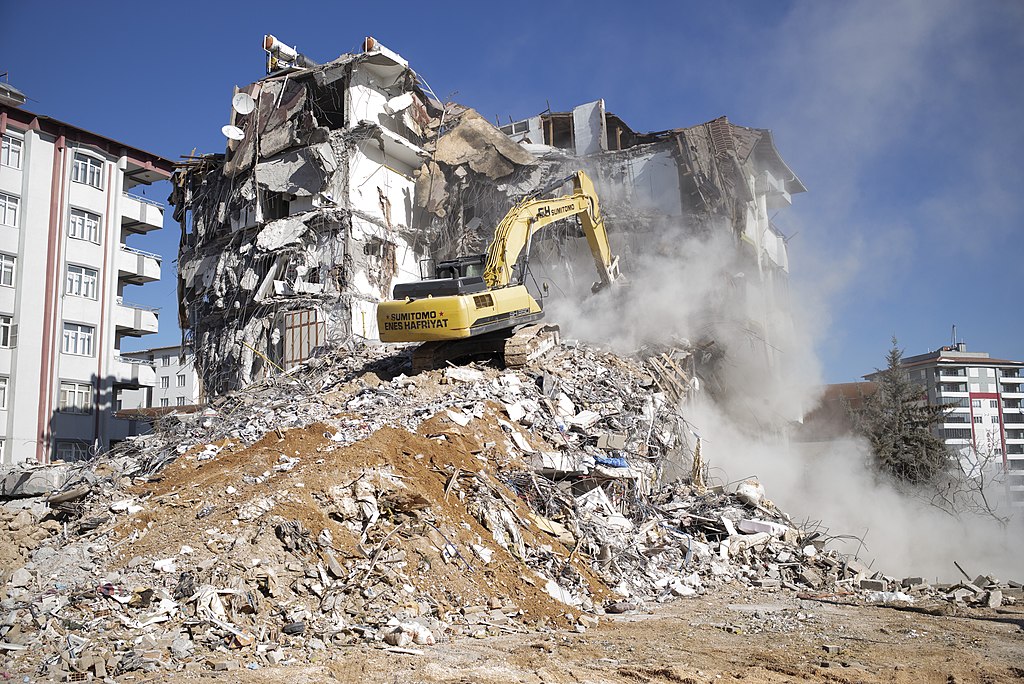
Heavily damaged building in Gaziantep, February 2023. Photo by Barbaros Kayan (European Commission Audiovisual Service). Source: Wikimedia Commons.
Turkey is not a poor country. It has significant financial resources, sufficient technological infrastructure, and a relatively well-educated, trained workforce to intervene effectively and quickly in such disaster zones. It has NATO’s second-largest standing army and the eleventh-largest in the world, with 425,000 active personnel.
Furthermore, the Ministry of Interior’s Disaster and Emergency Management Presidency (AFAD) had an annual budget of roughly U.S. $600 million in 2022. And the AKP, which has been in government since 2002, has collected roughly $36.5 billion in taxes or ‘the special communication tax’ for a so-called ‘earthquake fund’, while it is not clear where and how the AKP spent this resource or whether this resource is still available to help the victims.
The AKP also takes pride in the fact that Turkey is ‘one of the largest humanitarian donors globally, spending billions of dollars.’ Turkey ranked first in the world in terms of the proportion of its GDP devoted to foreign aid in the late 2010s and second only to the United States in terms of the amount of money spent on foreign aid. So if Turkey had these resources to spend and billions of dollars in the government’s budget for earthquake relief, why should it still need to solicit money from the public now to help earthquake victims?
The answer may be the AKP’s desire to bypass civil society’s efforts to directly reach out to earthquake victims because they are aware that it shows the people the incapacity of the government to effectively govern the country. Thanks to social media, millions of people in Turkey immediately sought alternative ways to help. Because many of these citizens believe that the AKP would pocket donated aid, and the ‘earthquake taxes’ they have paid since the early 2000s seem to have vanished, they are now reluctant to donate money to government agencies.
A republic of corrupt contractors
People in Turkey are particularly frustrated by the poor enforcement of construction codes that set the stage for the disaster.
As of now, we do not know how many of the collapsed buildings were built after the AKP came to power in 2002. But we know that 51 percent of the population in these 10 cities resided in buildings constructed after 2001. The internet is saturated with videos of collapsing buildings that were only a decade old. In addition, friends, family members, and former research informants verify that there is no evidence that newer buildings outperformed older ones in terms of earthquake resilience. These onsite observations may be disproved, but this question remains: why has the AKP government let the older buildings sit on their lots for the last 22 years even though we knew that this disaster was going to happen?
The answer to this question is not ‘the lack of resources.’ First, Euronews in collaboration with the Chamber of Architects of Turkey has calculated that the $36.5 billion collected as a ‘special communication tax,’ intended to establish an earthquake relief fund, was enough to cover the construction costs of roughly 1.3 million 1,000-square-feet or 93-square-meter of housing units. To put this figure into perspective, the region affected by the earthquake had roughly 1.5 million residential buildings.
Second, private construction contractors have made exorbitant profits during the AKP era. Profits that could have been properly taxed to enforce the construction codes and renew the older building stock. Turkey has spent a significant portion of its national savings on construction since the early 2000s: approximately 1.05 million residential buildings with two or more floors were built in the first fifteen years of AKP rule. When the party came to power in 2002, the construction industry produced roughly 5 percent of the national value added. These figures grew, with a short interruption due to the 2008 global financial crisis, reaching 9.5 percent in 2017. ù
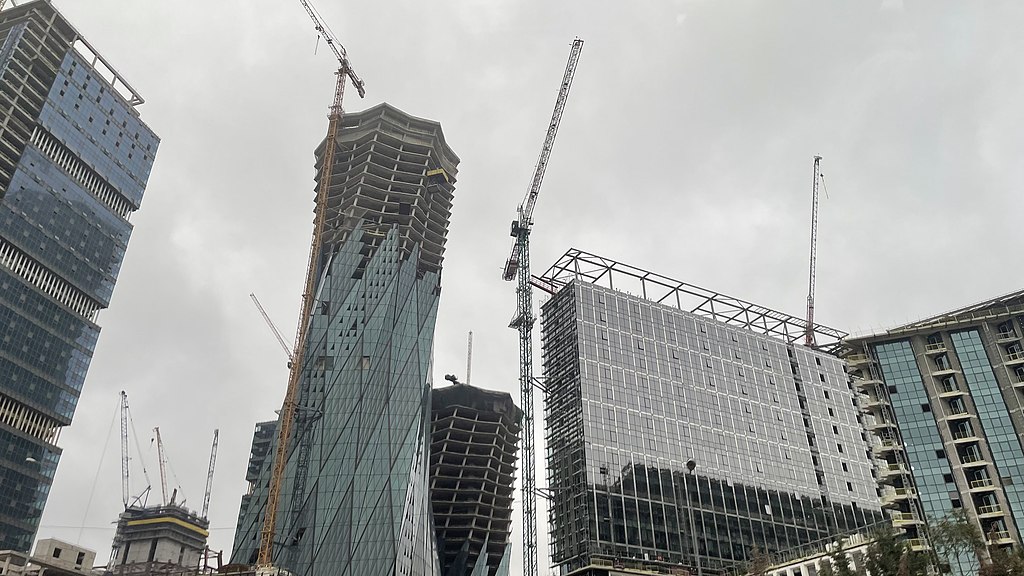
Istanbul Finance Center under construction in October 2021. Author: Metuboy. Source: Wikimedia Commons.
In other words, the construction industry doubled its share of the national economy under the AKP government, while the related figures for the global average declined for the same time period from 6.2 percent to 5.5 percent.
This marked a massive transfer of wealth to a coalition of construction contractors and manufacturing exporters. My calculations based on the Turkish Revenue Administration’s (TRA) construction cost index used for tax appraisal purposes and the Turkish Statistical Institute’s data on the registered value of new buildings for 2003–2017 illustrate a growing gap between the construction costs and the registered value of those new buildings: 1.05 million residential buildings constructed in this period were worth $515 billion, a figure equal to 60 percent of the Turkish GDP in 2017.
But the government chose not to use this growing pie as a resource to renovate older buildings, and builders chose investing in new construction projects, a much more profitable enterprise than fixing the older residential buildings. If the ratio of the total registered value of the residential buildings constructed in 2003 to their total construction cost had remained the same for 2003–2017, the registered total value of the 1.05 million residential buildings constructed in these 15 years should have been $416 billion. Had the multistory residential buildings been built to the highest safety standards between 2003 and 2017 and the contractors of these buildings accrued the same profits as they did in 2003, new construction would have earned roughly $99 billion less than the actual amount they pocketed in this period.
In short, consumers paid extremely high sales taxes for ‘the earthquake fund’ in the last two decades, only to find themselves buried under the wreckage of their own homes. But the contractors pocketed additional tens of billions of dollars. It could have been different, though. The AKP government could have either used that 36.5 billion in the ‘earthquake fund’ or taxed that $99 billion to rehabilitate older buildings and properly enforce the construction code.
One relevant question is, of course, where this $99 billion came from. The answer is a globalized financial market. Like China and many other export-oriented economies, Turkey buried a significant portion of its growing export revenue in the ground. And a major reason for this massive misuse of resources was the lack of perspective, creativity, and perseverance of the small- and medium-sized manufacturing exporters, many of whom made small fortunes thanks to the cheap labor of millions of industrious workers. Instead of using their growing manufacturing export income for high-tech and environmentally friendly investment projects, manufacturers chose to buy real estate as a way to save the value of their swiftly accumulating wealth.
In other words, the construction business in Turkey is a very costly and primitive form of banking for the nouveau riche.
The result of this real estate frenzy has been the mushrooming of vacant housing units all over the country. According to estimates done by the Istanbul Metropolitan Municipality, 400,000 to 700,000 of the housing units in Istanbul are vacant; this corresponds to roughly 2 percent of the entire housing stock in the country. There is no reason to believe that the situation is fundamentally different in other cities, so the share of the national housing stock’s vacant residential units could be as high as 10 percent. This is particularly alarming because the urban poor in Turkey’s metropolitan regions suffer from a severe housing crisis.
The massive wealth transfer from workers to manufacturing exporters and then to construction contractors has been one of the reasons why the AKP government has let the real estate frenzy flourish since the early 2000s. As the earthquake bitterly reminds us, this vicious cycle has not only constricted the distribution of income and wealth in the country but now cost thousands their lives.
Disasters and elections
The AKP came to power in 2002 after a 1999 earthquake in the northwestern region of the country that cost 18,373 people their lives and an economic crisis in 2001 that was the most severe in the history of the Republic. Much like the current earthquake, the 1999 disaster hit one of the economically most vibrant regions of the country and was one factor in triggering the economic crisis two years later.
The AKP seized upon the 1999 earthquake as a political metaphor. Both Recep Tayyip Erdoğan, the current president of Turkey, and the Islamist media called the disaster a sign of ‘the collapse of the state’ (See Yeni Şafak). Some Islamists even dared to frame the disaster as God’s punishment for the debauchery of women who were not in hijab. In other words, both parties used the earthquake and the financial crisis to justify the moral and economic merits of a prospective Islamist government.

A damaged building on the main street of Duzce, November 1999. Author: Roger Bilham. Source: Wikimedia Commons.
The parallels between these incidents and what is happening now resonate for many in Turkey. Per capita income in Turkey has been declining for nine years, and the 2023 earthquake was even more devastating than the one in 1999. Could this dual crisis lead to a revolt at the ballot box just like the one in 2002 that brought the AKP to power – but in reverse? The regime certainly thinks so. There are the presidential and parliamentary elections this year, and Erdoğan’s clique has been working on a ‘damage control’ strategy since the moment the earthquake struck. In the wake of a brief TV appearance roughly 10 hours later, Erdoğan disappeared for 25 hours, even as people buried under the wreckage waited for help. The Erdoğan government seemed not to use this time to coordinate rescue efforts but to re-frame their election and propaganda strategy.
Putting all the pieces together, five components seem to make up the backbone of their master plan.
The first is to prevent the victims’ frustration from taking over the national political agenda. An emphasis on the magnitude of the earthquake by government officials and government-led media is part of this tactic. The government right now is working to convince the public that they could not have done anything to save the people since the earthquake was exceptionally severe.
Second, there are strong signals on social media that Erdoğan and his clique are refining and disseminating a conspiracy theory: that the United States triggered the earthquake with its advanced military technologies.
A third and similar component is to present anonymous civilians, not contractors, the government, or the real criminals, as ‘looters,’ the ‘bad apples’ of an otherwise glorious nation, at the center of a hate campaign. Erdoğan dedicated a significant portion of his February 10 speech in Adıyaman to the condemnation of looters, establishing a symbolic link between them and his political opponents. As he promised his audience, ‘we will allow neither the looters nor those, who turn our pain to a political looting strategy, to achieve their goals.’ This rhetoric is very dangerous, literally blaming the victims in disaster-struck regions, some of whom, in the absence of government assistance, have to procure basic needs such as food, clean water, or diapers from the closed supermarkets and grocery shops nearby.
After Erdoğan’s speech, social media was filled with disturbing reports and videos of civilians severely beaten up by the police. In one reported case, an alleged looter died in the police station after he, according to the official report, ‘hit his head to the wall when he was under arrest.’ Mobs joined law enforcement in this anti-looter campaign. In one video, the corpses of three young men were piled up on the street by mob members, who killed them to allegedly protect their decades-old furniture and appliances. In another video of the same incident, the law enforcement officers are seen to be simply standing by while the mob was cheerfully taking pictures and videos of the corpses as a symbolic trophy of their victory.
The fourth part of the plan is to use the disaster to curb democratic rights before this year’s election. The AKP government declared a three-month-long state of emergency in the earthquake zones, where roughly 16 percent of the population resides. Kurds and Alevis account for a major portion of these voters, and Kurds’ votes will likely play a decisive role in election results. Polls consistently show that the two election blocs—respectively led by Erdoğan’s Islamist party and the social democratic main opposition, the Republican People’s Party (CHP)—have close voting shares.
So no one should be surprised if the AKP government turns the earthquake into a part of its broader voter suppression strategy, just as it did a few years ago: during the two-year-long nationwide state of emergency after the failed coup attempt in the summer of 2016, the Islamist government silenced the opposition to pass constitutional amendments in 2017 that helped Erdoğan to consolidate his strongman regime. Importantly, if the pro-Kurdish Peoples’ Democracy Party (HDP) supports the main opposition’s election bloc, Erdoğan’s election coalition will likely lose the election; if they can be swung to the AKP, it will win.
Finally, the AKP government will also use the disaster to promise investment that will consolidate its support among the owners of small- and medium-sized enterprises (SMEs) in the manufacturing and construction industries. It is notable that one of Erdoğan’s first post-earthquake promises was not to swiftly save victims from the wreckage but to reconstruct those collapsed buildings ‘in one year.’
Similarly, in his first press declaration one day after the earthquake, Mustafa Varank, the Minister of Industry and Technology and Erdoğan’s right arm, joyfully stated that ‘the earthquake did not affect the industrial facilities in the region and this is good news.’ Varank also knows that the immediate problem before him is not a humanitarian crisis but the economic consequences of the disaster for SME owners: without their support, the AKP government cannot stay in power.
In other words, the parallels between the conditions before the AKP’s rise to power in 2002 and the current circumstances are strong, and Erdoğan’s clique has a well-thought-out political and economic strategy that makes the earthquake the centerpiece of their path to victory in the next election. We can only hope that Turkish voters see through it, establishing the connection between this disaster and decades of corrupt policies this time and making a firm decision about what they want for their own future.
Published 17 February 2023
Original in English
First published by Public Seminar, 16 February 2022
Contributed by Public Seminar © Utku Balaban / Public Seminar / Eurozine
PDF/PRINTIn collaboration with
In focal points
- Living dead democracy
- Why Parliaments?
- Spelling out a law for nature
- No more turning a blind eye
- The end of Tunisia’s spring?
- Protecting nature, empowering people
- Albania: Obstructed democracy
- Romania: Propaganda into votes
- The myth of sudden death
- Hungary: From housing justice to municipal opposition
Newsletter
Subscribe to know what’s worth thinking about.
Related Articles
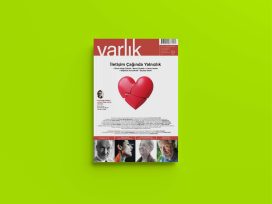
Digital loneliness
Varlık 6/2024
The case for more embodied communication; on digitalisation and the privatisation of art; a balanced view of gaming; the historical roots of social polarisation in Turkey; and isolation in the films of Nuri Bilge Ceylan.
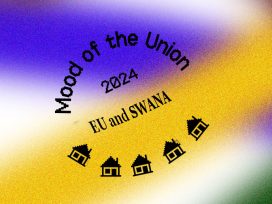
Cooperation or neocolonialism?
The EU and SWANA
From migration to trade and energy, the EU’s partnerships with Mediterranean non-EU countries are influenced by a neocolonial mindset. The bloc must shift from its current tactics of exclusion and resource extraction towards genuine cooperation that respects the sovereignty and aspirations of these crisis-struck nations.




